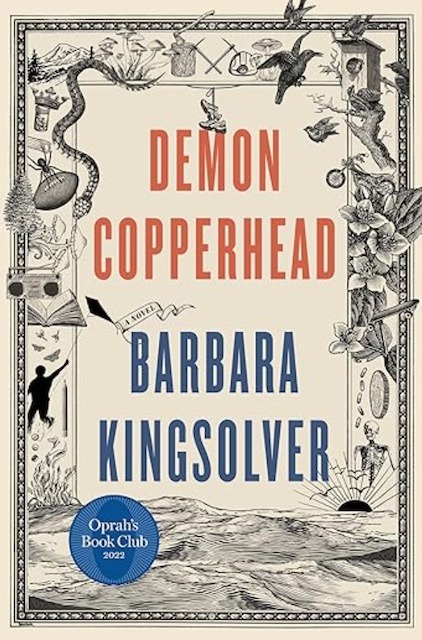Real Writers Top Four
- Barbara Kingsolver’s Demon Copperhead is a masterclass in voice. And imagination. (I’m near the end; haven’t quite finished.) It is immersive and all-encompassing. In an interview, Kingsolver said she spent more than two years trying to figure out how to get into the story. Two years! The work paid off. “I wanted to write about the opioid epidemic and the kids who have been orphaned by this crisis and how that’s really changed our whole community, our schools, everything. People have ideas about addicts and, you know, personal weakness and stuff. And they also have ideas about Appalachia. And I really wanted to get through those, get past those stereotypes. I really wanted to write the great Appalachian novel and I didn’t know how to do it (and) I had this sort of surprising, ethereal conversation with Charles Dickens while I was staying the night in his house, thinking he wasn’t there. But he was.” Sure, why not channel a great storyteller? A brilliant book. I love how well she can describe the “big idea” of the novel, which went on to win The Pulitzer Prize.
- Another book all writers should read is Yellowface by R.F. Kuang. It’s about a struggling writer, June Hayward. June’s much more successful writer friend, Athena Liu, suddenly dies. The struggling writer steals the dead writer’s work-in-progress and rockets to fame. She is living a lie. Well, I used the word “steals” and here’s where things get fuzzy. The struggling writer, June Hayward, uses the dead writer’s manuscript as a foundation for her “new” work but adds in some of her own writing and research to, perhaps, convince herself that she’s given the story her own spin. But I didn’t buy the fact that Liu hadn’t told her agent or editor about her next work in progress, a novel about the unsung contributions of Chinese laborers during World War I. So specific! I couldn’t quite swallow that Hayward would have been able to swipe that “idea” and pretend it was her own. Wouldn’t Liu have told her agent about her next project? Or her editor? Yes, suspicions mount—but not fast enough. Nonetheless, writers will read Yellowface like popping candy. There are layers of issues about cultural appropriation, too. It’s a highly readable novel—juicy and twisty. Did you read it? What did you think?
- Good article on the Now Novel website about writing dialogue. “Making dialogue sound natural.”
- This profile in The New Yorker of Joyce Carol Oates by Rachel Aviv is long, but a must-read. It’s about Oates’ “relentless” search for self. Sample line: “Like people who cut themselves because the pain is a reminder that they can feel, Oates seems to be drawn to violence as a kind of enlivening act.” Truly fascinating insight into Oates’ drive to write (58 novels to go with many short story collections, plays, and poems).
Category: Uncategorized


All writers should read the Covenant of Water.
Love these suggestions.
Thanks!
Great suggestions. Thanks, Mark!